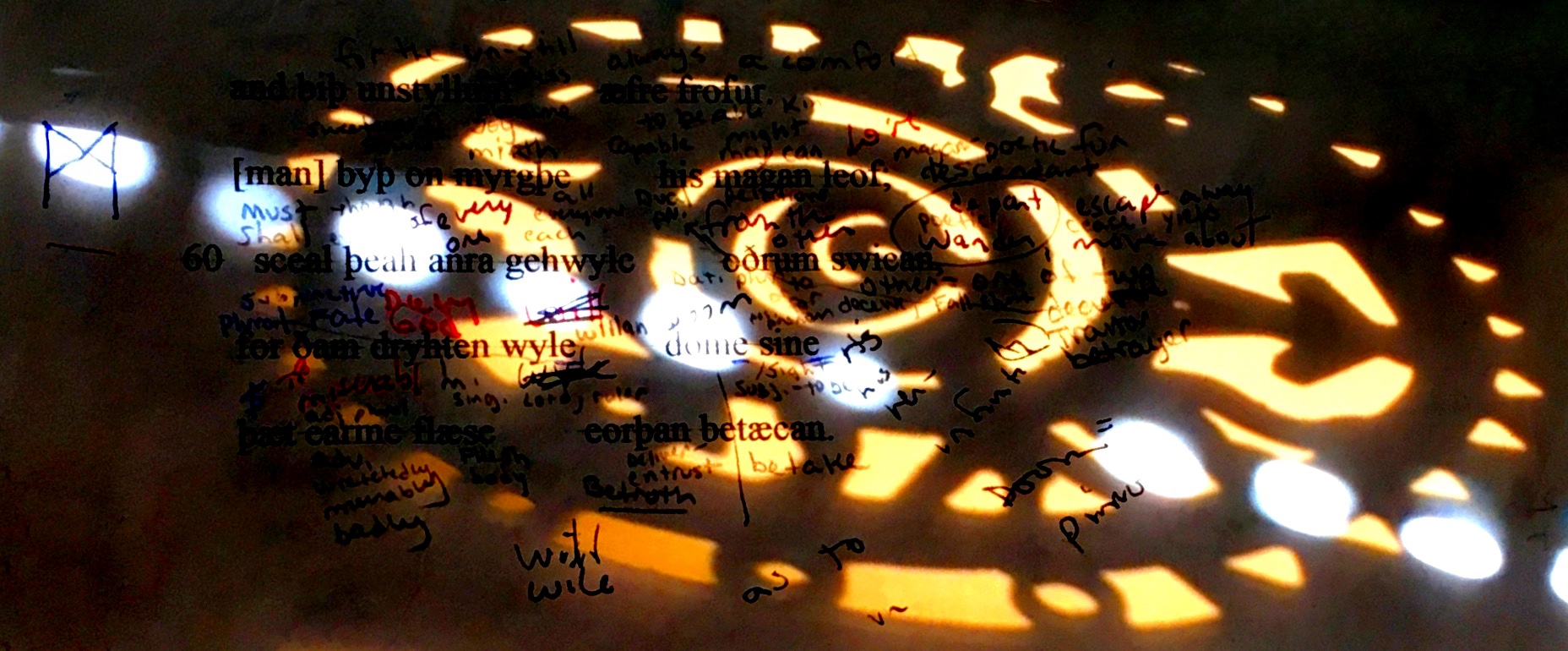 In Old English, a mann is a human being of any gender, translated into modern English as anyone, they, people, a citizen, a human. Mann is not a male person here, so when you see Mann as the name of this rune, it does not mean man as in male. Most correctly it can be either Person or Human but I need to pick one: Human. Person says more about ourselves as bodies. We carry things on our person, we are a person in a room. We are also a human in a room, but we do have a collective human nature, a human understanding, and human sensibilities. Human is a word that suggests the connection we have from our shared experience of being people in the world. It’s a choice that feels right to me as an answer to the riddle of the stanza. Maybe I’m wrong. As a person I’m only human.
In Old English, a mann is a human being of any gender, translated into modern English as anyone, they, people, a citizen, a human. Mann is not a male person here, so when you see Mann as the name of this rune, it does not mean man as in male. Most correctly it can be either Person or Human but I need to pick one: Human. Person says more about ourselves as bodies. We carry things on our person, we are a person in a room. We are also a human in a room, but we do have a collective human nature, a human understanding, and human sensibilities. Human is a word that suggests the connection we have from our shared experience of being people in the world. It’s a choice that feels right to me as an answer to the riddle of the stanza. Maybe I’m wrong. As a person I’m only human.
Like the runes for Day, Home, and Joy, the Human rune is sometimes used as a grammalogue or stand in for the word human. Here it is in the Exeter Book poem The Ruin: meodoheall monig ᛗ dreama full. Many a meadhall full of human joy. Everybody is happy in a meadhall.
I used to translate Mann as Mann capital M, just as it looks and sounds, as a way to wonder about the deity named Mann. Also named Man, Mannus, Mani, Mannan, Manannan, Manannan mac Lir. One god can come in several varieties sometimes. There’s a whole pantheon of deities in the Rune Poem (including one that may not have existed) as well as gods right here in this stanza, reminding everybody listening that they are the ones steering this particular ship. Is Mann one of them? Maybe, but there is nothing here that can tell us for certain.
What is certain, at least to the people of the Rune Poem, is that to them death is a form of betrayal. We see this both here and in the Grave stanza. The word siwcan, means wander or depart sometimes, and only in poetry, and rarely. I use depart as it seems to fit the sense nicely here for a mention of our dearly departed, but you can’t discount parallel meanings in Old English, and most of the time the word swic has to do with betrayal and deception. This is more clear in the Grave stanza where covenants are betrayed by death. How is death a betrayal when it’s not exactly something we can avoid? In the culture of the Old English Rune Poem, the family (extended, the tribe, the clan) was the most important relationship you had. Maintaining kinship relationships meant everybody’s survival, and exile from the family community was the most grievous punishment imaginable. Leaving voluntarily with no intention of return would have been an unthinkable betrayal. Death is a departure with no return. Have you ever been mad at somebody for dying and leaving you forever? I have. Don’t do me like that.
The word dome, doom returns here, we can’t exile fate. Dome also appears in the first stanza and also in the context of the gods judging us. We will depart from here and face our doom, and it’s irrevocable. When? We’re not the ones who’ll decide. The gods will eorþan betæcan, betake, entrust, but also betroth, us to the earth. The gods are our matchmaker and there is only one suitor. The earth will be our consort.


